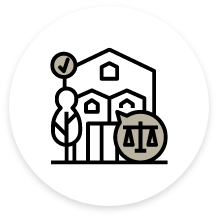Through advocating, independently or in co-operation, with other civil society entities, grassroots and popular organizations, social movements, independent institutions, academic networks, and activist platforms, HIC works to achieve social justice and improve living conditions across five strategic areas:

Housing & Land Rights
Social Production of Habitat

Habitat and Gender

Sustainable Enviroment

Housing & Land Rights
Know more
Social Production of Habitat
Know more

Habitat and Gender
Know more

Habitat and Sustainable enviroment
Know more
Our Strategic Priorities
Our Guiding Principles
Beyond these strategic areas, HIC’s advocacy work is guided by a set of guiding principles, committed to the defence of habitat-related human rights and to building a present and future based on social and environmental justice. These principles are outlined in the Habitat Voices Manifesto:
Profound economic redistribution
Recognition of differences and invisibilities
Parity in political participation
Human rights habitat, not war
Mutual care and solidarity
Profound economic redistribution
Structural transformation requires adopting a feminist perspective across the defense of all habitat rights, enforcing the social function of property and land; criminalizing forced eviction; reversing privatization of public and communal land, goods and services; more-progressive taxation of individuals and corporations, land and property; budget reallocation to socio-environmental protection and climate justice, investing in solidarity economies and demilitarization.
Recognition of differences and invisibilities
To be truly transformative, a profound economic redistribution relies on the recognition of differences, invisibilities and inequalities. It is urgent to protect everyone from discrimination, stigmatization and marginalization; actively combating racism, promoting gender equality, valuing multiple social identities, social production and management of habitat; cooperativism; care giving and social reproduction primarily performed by women, solidarity economies, bio/cultural diversity, and integrated rural/suburban/urban development.
Parity in political participation
Mechanisms, at various scales, are needed for universal and inclusive democratic participation that does not marginalize anyone on the basis of gender, sexual orientation, class, age, ethnicity, religion, physical or mental ability, or any other status.
Human rights habitat, not war
Like the UN Secretary-General, we urge a global ceasefire to prioritize together COVID-19 responses and recovery, prompt and meaningful reallocation of resources away from militarism, ending foreign and military occupations, and upholding extraterritorial human rights obligations
Mutual care and solidarity
As indeed we are all in this together, each of us bears both a personal and a social responsibility to take all measures possible to stop the spread of COVID-19. In addition we need to actively practice mutual care and solidarity, and avoid the gratuitous production of waste and release of toxins of any kind. This includes reducing consumption of fossil fuels and animal products.
Strategic processes and advocacy opportunities
Based on these focus areas and guiding principles, HIC has been committed to engaging in a set of strategic processes on the international level. Beloz you can find a summary of these process and the priorities that guide HIC’s advocacy for each one, as well as a list of advocacy spaces and opportunities related to each process. These are not a list of activities that HIC is developing; but a collective mapping of opportunities to support advocacy. This is an on-going exercise that is under construction and will be collectively built. We will update it ahead of each quarterly advocacy meeting, consulting members to share relevant opportunities. For detailed information on activities being developed by HIC and its members, don’t forget to consult our calendar and social media channels.
Sustainable Development Goals (SDGs)
HIC advocates within the Sustainable Development System, using the human rights-based approach to monitor and evaluate states’ commitments related to habitat issues and associated human rights.
There are no upcoming events at this time
Habitat Rights in the International System
– Mainstreaming the relation to habitat rights
– Accountability with countries
There are no upcoming events at this time
New Urban Agenda
HIC is committed to contribute to the implementation of the New Urban Agenda (NUA), the third global Habitat Agenda since 1976, at the international, national and local levels. HIC actively contributed during the process of drafting the NUA, which will serve as a guideline for urban development for the next twenty years. Key for NUA related advocacy is to guarantee alignment with Human Rights obligations. You can read some of HIC’s key messages prepared for the 5-year review of NUA’s implementation.
There are no upcoming events at this time
Climate Justice
HIC is committed to and involved in the struggle for Climate Justice, calling for it to be treated and enacted as a fundamental Human Right related to Habitat. This call is is rooted on the five pillars of HIC’s Habitat Voices Manifesto, linking equality, individual and collective human rights, and historical responsibilities for climate change as an urgent political and ethical issue
There are no upcoming events at this time
Gender equality
HIC reinforces its social strength and its capacity to influence progress and mainstream gender and human rights related to habitat. The intent is to fully integrate SDG 5 and CEDaW obligations and General recommendations with HIC’s commitment to gender equality across all HIC’s organisational objectives.
There are no upcoming events at this time
Food sovereignty
HIC advocates for food sovereignty by putting the people who produce, distribute and consume food at the centre of decisions about food systems and policies, rather than the demands of markets and corporations, mainly at the International Planning Committee on Food Sovereignty.
There are no upcoming events at this time
Displacement & Crisis
HIC-HLRN monitors and compiles data on housing and land rights violations in order to give visibility and propose solutions in cases. The resulting displacement crises not only creates worrying logistical and humanitarian consequences, but further threaten international security and risk the lives of displaced people, aid workers, human rights defenders and peacekeepers.
There are no upcoming events at this time






